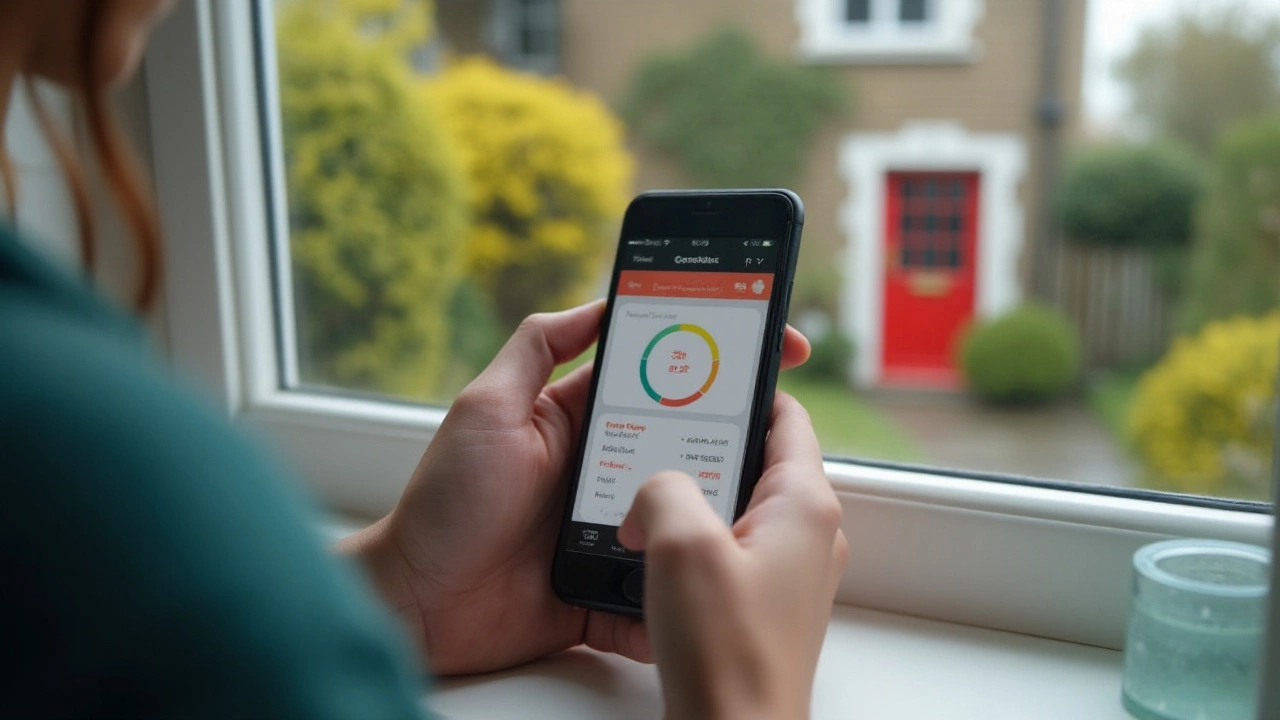In the grand adventure of buying your first home, one daunting obstacle looms large: the down payment. For many, gathering that lump sum is elusive, but you might find hope in loans requiring no money down. As enticing as it sounds, your credit score plays a pivotal role in these scenarios.
Let's dive into the crucial numbers. Your credit score signifies your financial reliability. Lenders scrutinize it to determine if offering you a mortgage is a calculated risk or a financial gamble. Particularly for loans with no down payment, maintaining an admirable score is non-negotiable.
Whether you are eyeing a cozy suburban nook or a downtown gem, knowing what credit score you'll need is your first step. And while credit scores can feel like an unfair measuring stick, they don't have to be immovable. We'll delve into what these scores mean and how they play a part in scoring your dream home sans initial payment.
- Understanding Credit Scores
- No Money Down Home Loans
- Minimum Score Requirements
- Improving Your Credit Score
Understanding Credit Scores
When contemplating the exciting, albeit nerve-wracking journey of purchasing your first home, especially with a no money down option, one crucial aspect that holds significant sway is your credit score. So, what exactly is a credit score, and why does it wield such power in the lending world? Essentially, your credit score is a numerical expression based on your credit history, used to assess your creditworthiness. Ranging generally between 300 and 850, these scores encapsulate your financial behaviors in a tidy figure that speaks volumes to lenders.
Perhaps you're wondering how these scores get calculated. Well, several factors contribute to this powerful number. Payment history often holds the most weight, making up a significant portion of your score. Additionally, factors like amounts owed, length of credit history, new credit, and types of credit in use also play their part. It's a blend of these elements that either uplift your score or drag it down. For instance, consistently late payments can cause a significant dip, whereas maintaining low credit balances may bolster it. Interestingly, our financial reputations can feel distilled into this three-digit number, but remember, it’s more a reflection of past actions rather than future intentions.
The Importance of Understanding Your Score
But just how important is it to understand your credit score when trying to purchase a home? Tremendously so, especially when considering first-time buyer programs that require no money down. Lending institutions view your credit score as a crystal ball of sorts, predicting your ability to repay loans. A high score tells lenders you're trustworthy with money, whereas a lower score might present you as a risk. This means understanding and improving your score could open doors to better loan conditions and interest rates, potentially saving you thousands over the life of a loan.
As the financial guru Suze Orman once said,
"Owning a home is a keystone of wealth... both financial affluence and emotional security."Understanding your credit score is undeniably one of the keystones in achieving this goal. For first-time home buyers, being equipped with this knowledge is like holding the map that guides you through the labyrinth of mortgage options.
Credit Score Range Impact
Delving further into specifics, let's consider the impact the different ranges of credit scores can have. While a score above 800 is typically considered excellent and could make loan approval smoother than a summer breeze, scores between 740 to 799 are named very good and are also likely to unlock favorable loan terms. Meanwhile, those in the 670 to 739 bracket are often perceived as good, opening many lending doors, albeit not the premium ones. Anything below 670 sees you treading into fair and poor territories, which might complicate acquiring no money down options significantly. Lenders may perceive these scores as too risky for mortgage approval, or if approved, might involve less-than-ideal interest rates.
In some contexts, data suggests that approximately 21% of Americans had a credit score below 649 in recent years, showcasing the commonality of such challenges. Remember, a healthy credit score isn't just a number; it's potentially your ticket to home ownership with reduced hassle. In understanding where your score stands, you begin plotting the path ahead, armed with active steps to nurture a score that reflects your fiscal maturity.

No Money Down Home Loans
Imagine a world where you can embrace homeownership without that perilous hurdle of scraping together a down payment. That world is not just a dream—it can be a reality through loans designed specifically for times when upfront money is scarce. These options are tailored with the first-time homebuyer in mind, and they aim to turn what seems like a distant opportunity into a tangible step you can soon walk through your very own front door.
One of the most prominent players in the realm of no money down home loans is the VA loan, available to veterans and active military members. This powerful financial tool offers a path to purchase nothing short of a home without the grip of a down payment. Did you know that VA loans don't even require private mortgage insurance (PMI), which can save buyers hundreds each year? It's part of a package designed to give back to those who have served.
"The VA home loan program provides our veterans with the financial backing and support they need to secure housing without initial large sums," says Jim Quigley, National Association of Realtors executive. "For many, it's an opportunity to transition from renting to owning without the financial bottleneck."
Another option in your toolkit is the USDA loan, aimed at those looking to plant roots in rural areas. While this might conjure images of remote landscapes, the reality is that many suburban areas fall under the USDA umbrella. To qualify, though, you'll need to meet certain income thresholds, which tend to lean towards those earning moderate or low incomes. This option not only allows for zero down payments but also offers competitive interest rates to ensure affordability.
| Loan Type | Down Payment Required | PMI Required |
|---|---|---|
| VA Loan | No | No |
| USDA Loan | No | No |
What about the FHA loan? Although traditionally associated with low down payment options rather than zero, it's important to keep it in your consideration. Sometimes adaptable local grants available to first-time buyers can cover the low down payment requirement, effectively making it a no-money-down arrangement. FHA loans come with the benefit of being accessible to those with lower credit scores, making this another viable path for many would-be buyers.
While the prospect of purchasing without a down payment opens doors for many, it's imperative to read between the lines. The trade-offs might include slightly higher interest rates or more rigid lending criteria. As we traverse through these loan types, knowing your circumstances and eligibility can better inform you which path is right for you. By carefully weighing your options, consulting with mortgage advisors, and meticulously planning, you'll be holding those new house keys sooner than you imagined.

Minimum Score Requirements
When it comes to eyeing a home with no down payment, understanding the credit score requirements is indispensable. While each lender ticks slightly differently, some standard benchmarks guide the industry. Are you planning to hop on a VA loan? Veterans and active service members often lean towards this option, requiring no money down. But hold up, your credit score should ideally sit around 620. Anything lower, and you might face a few more hurdles on this journey, but don't fret, as there are workarounds!
Let's not forget the USDA loans, which swoop in to help potential homeowners in specified rural areas. For these beauties, a credit score of 640 often does the trick. This threshold offers lenders the calm assurance they're not tossing their chips blindly onto your table. But what if your score dips below the mark? Establishing a solid history of on-time payments may aid in easing their concerns.
According to a report by Experian, "The national average FICO score hit a record high of 711, indicating credit improvement on a wide scale." While this might sound daunting, it places many borrowers in good stead when seeking loans requiring no down payment.These benchmarks, set and adjusted by market trends and economic shifts, aim to balance lender risks and borrower opportunities.
For those unable to meet these targets, hope isn't all lost. Dive into strategies to boost your score. Look into managing outstanding debts or contemplate enrolling in a credit repair program. Remember, patience is king here. Changes often manifest gradually, not overnight. When you decide to make that plunge into homeownership, align your credit score with the requirements and stick to the path you've charted. These adjustments could make the difference between signing on the dotted line or retreating to the planning desk.
Shaping one's credit can feel like an often overwhelming mountain to climb. Yet, by understanding factors pivotal to a healthy report and acting mindfully on these bits, you can steer your course toward acquiring your dream home, even when money for a down payment is scarce. Much like learning anything for the first time, keep yourself informed, explore as you go, and never hesitate to seek advice when the waters feel murky.

Improving Your Credit Score
Embarking on the journey to improve your credit score is not merely a financial activity; it's a transformative experience that demands commitment and understanding. To begin, clarity is crucial. Start by obtaining your credit reports from all three major bureaus: Equifax, Experian, and TransUnion. You have the right to one free report from each per year—a chance not to be missed. This will act as your benchmark, a financial selfie, showing every mark and misstep along your credit history. More often than not, inaccuracies can slip in unnoticed, like an unmarked pothole on a well-traveled road, and addressing these discrepancies can sometimes yield an instant boost.
Once you've assessed your starting point, controlling outstanding debts should be your next move. A disciplined approach to managing debt is like speaking the universal language of creditors, letting them know you mean business. Prioritize debts with the highest interest rates, which saves money and reflects responsibility. Simultaneously, avoiding new credit applications during this enhancement phase is wise. Each credit inquiry causes a slight dip, limiting your room for error while climbing the credit ladder.
Developing a punctual payment routine is another critical element. Every timely payment is like a rung on the ladder, elevating you toward that dream home with no money down. Leverage technology as your ally by setting up automatic payments to dodge any risk of tardiness, no matter how brief. A single late payment can cast a long shadow on your financial record.
"The need for financial discipline cannot be overstressed," suggests Christine Lagarde, President of the European Central Bank. "A good credit score is a passport to financial opportunities."
Consider those old, dormant cards in your wallet. Once a tool for minor indulgences, they can become a secret weapon. By keeping them open, you enhance your credit utilization ratio—a metric crucial in calculating your credit score. This ratio is a fraction of your total credit limit that you're actually using; the lower it is, the better it appears. Paying down balances while maintaining old accounts can provide a doubly effective one-two punch.
Every journey thrives on sustained effort and improvement in credit scoring is no exception. Can one imagine the impact of a minimal interest in accumulating savings over decades? In the same vein, small, regular steps taken in managing finances amass into a credit score more robust than one could ever imagine possible. Celebrate small victories along the way, like the first month of zero delayed payments or a noticeable drop in credit card debt.


Corbin Fairweather
I am an expert in real estate focusing on property sales and rentals. I enjoy writing about the latest trends in the real estate market and sharing insights on how to make successful property investments. My passion lies in helping clients find their dream homes and navigating the complexities of real estate transactions. In my free time, I enjoy hiking and capturing the beauty of landscapes through photography.
view all postsWrite a comment